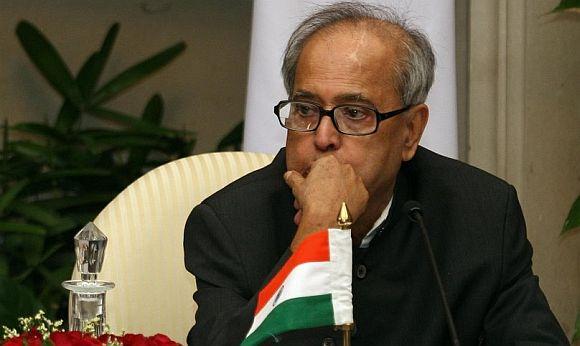
Finance Minister Pranab Mukherjee may be right in pushing for FDI in retail because reports have been pouring in, indicating that the economic downturn in India and abroad will worsen in coming weeks.
Sheela Bhatt examines the politics behind the government's decision.'I want money,' an agitated Finance Minister Pranab Mukherjee reportedly told the Cabinet on Thursday, November 24, when coerced by colleagues from his Congress party for pushing 51 per cent Foreign Direct Investment in retail.
The FDI issue is so sensitive that Defence Minister A K Antony, Rural Development Minister Jairam Ramesh and Small and Medium Enterprises Minister Virbhadra Singh tried to argue with the finance minister against the decision.
The interaction amongst the ministers suggested that Mukherjee was pushing a sensitive economic reform to stop the outflow of FDI and to create positive market sentiment to arrest the fall of the Bombay Stock Exchange's Sensex to below 10,000 points.
The finance minister is also worried about the decline in the value of the rupee.
Please ...
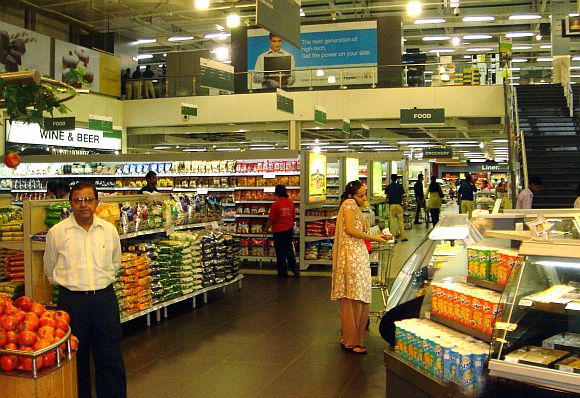
During the course of the Cabinet meeting last Thursday, Mukherjee grew so angry with the resistance to the move posted by Railways Minister Dinesh Trivedi, who belongs to the Trinamool Congress, that Trivedi eventually walked out.
After Trivedi left, the Union Cabinet approved the 51 per cent FDI in retail.
Parliament remained paralysed on Monday as Opposition parties and the United Progressive Alliance government's allies protested the announcement on FDI.
The government is inviting multinational retailers to invest in India's $400 billion retail trade, a move its critics claim will be detrimental to the nation's 12 million shopkeepers.
Why was the finance minister adamant to get Cabinet approval for the controversial decision when Parliament is in session and weeks before Uttar Pradesh has an assembly election?
Why did Prime Minister Manmohan Singh not bring the issue to the Cabinet before or after the winter session of Parliament?
"Pranab Mukherjee," a Cabinet minister told Rediff.com, "kept saying 'I want money'."
Please ...

The finance minister could be right because reports have been pouring in, indicating that the economic downturn in India and abroad will worsen in coming weeks.
Speaking to the CNBC television channel, Gautam Shah, an analyst at JM Financial, a well-known investment company, predicted that the Indian stockmarkets will fall in the coming six weeks.
During his interaction on CNBC, Shah also predicted 'a collapse of the US markets in the next 3 or 4 weeks, and believed that the horror of September 2008 will be played out once again in the next 4 to 6 weeks.'
A senior economist told Rediff.com, "It is possible that Mukherjee is trying to retain a firm image of the Indian economy and the growth story. The Congress party must have gone along with him to stop further carnage in the economic sector early next year."
Please ...
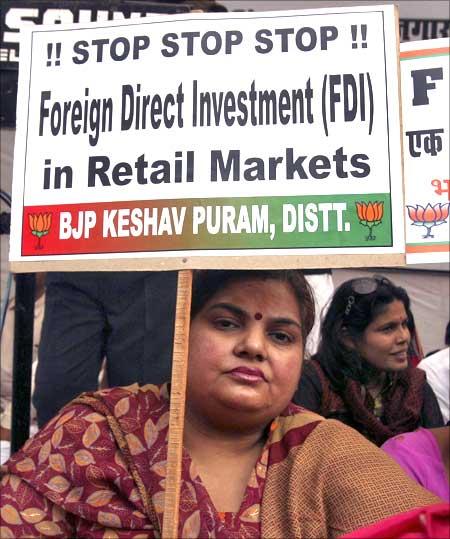
Civil Aviation Minister Vayalar Ravi told Rediff.com, "The opposition to 51 per cent FDI is political. Please highlight that every state has the right to not adopt the FDI route. The BJP states are free to reject 51 per cent FDI in retail."
Ravi, a Socialist at heart who is not completely in agreement with the decision, but has gone along with the majority view in the Cabinet, says, "The FDI in multi-brand retail is an experiment!"
Ravi believes the "Opposition may use the FDI issue, convincingly, amongst retailers, but we know it is not going to impact them (retailers) in the long run."
Please ...

If the Bharatiya Janata Party-ruled states do not want the money from multinational retailers they can reject the Centre's policy, as retail is a state subject.
Congress leaders point out that the BJP manifesto for the 2004 general election had mentioned that the party supported multinationals in multi-brand retailing. Then why oppose it now?
Interestingly, some Congress Members of Parliament argue privately that in the worst case scenario, the FDI in retail issue will get a "mixed response" from Congress voters.
The Congress's traditional vote bank will not be affected by the decision, but the BJP's core voters will be affected more.
Please ...

A Congress leader, in the know of things, explains: "In the Indian retail chain, 'wholesalers' exploit the system. They buy cheap from farmers and small producers. They add a huge commission or profit and sell it in towns and cities at a hefty price."
"These wholesalers and traders of consumer goods are, on many occasions, BJP sympathisers," he adds. "Their grip on India's wholesale market will be affected if multi-brand retailers come in with a smart and efficient system that will help them procure farm products, textiles or consumer products directly from small and medium producers."
In political terms, the decision to approve 51 per cent FDI in retail will hit hard the BJP's core voter group, but it will benefit marginal, small and medium manufacturers or producers of farm products who are attached to various political parties, including the Congress party.
A senior Congress MP from south India, however, felt the problem with Dr Singh's government is that it does not understand the importance of transparency in decision-making.
Please ...
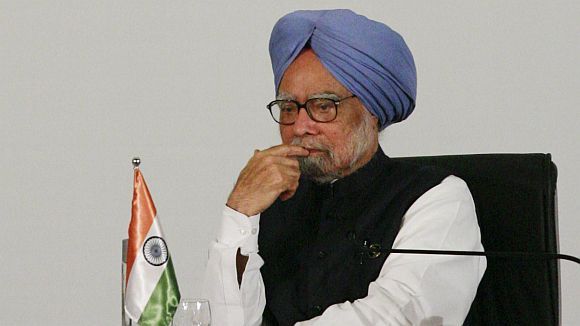
Railways Minister Dinesh Trivedi of the Trinamool Congress, who opposed the FDI issue at Thursday's Cabinet meeting, kept telling his colleagues before walking out that he be allowed to speak; that the issue be debated threadbare.
Trivedi was surprised to see Finance Minister Pranab Mukherjee get angry and anxious to bulldoze the Trinamool point of view on the FDI issue.
In New Delhi, when one hears the arguments made by Congress and BJP MPs for and against FDI in retail, it becomes clear that the Manmohan Singh-led government confronts a crisis because it does not have a political face to communicate with the masses and convey its point of view.
When Commerce and Industry Minister Anand Sharma addressed a press conference soon after the Cabinet decision on FDI, he lacked the necessary political weight to counter the arguements against the move posted by both the BJP and its allies, and the Communists.
His statements only conveyed the logic behind the economic decision, but political commonsense was missing from his pronouncements.
Please ...
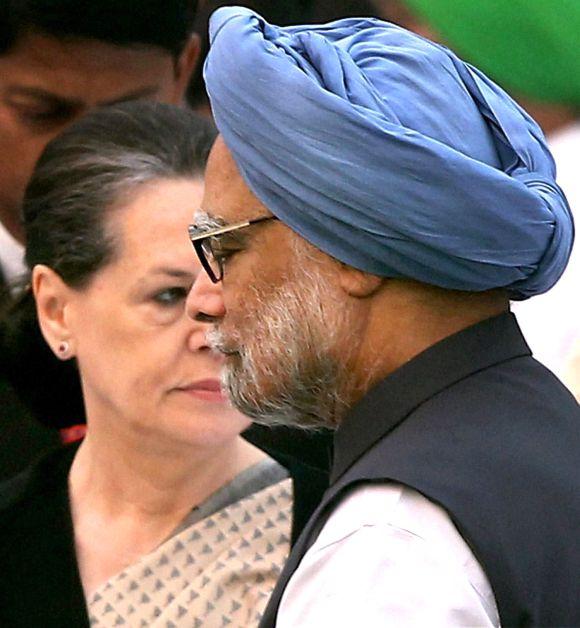
If one goes by the dissenting voices emerging from the Trinamool Congress, the BJP, the Communists and other regional parties, the government will be forced to dilute or delay the FDI in retail issue.
The government is unlikely though to roll back the decision, which has international ramifications. If the Congress is forced to scrap the move, Dr Singh will lose the credibility to govern.
One can only pity the government whose two most powerful party leaders -- Congress party President Sonia Gandhi and General Secretary Rahul Gandhi -- have not supported its decision yet.
The Indian Youth Congress is currently holding its first-ever convention of elected office-bearers, Buniyaad, in New Delhi. Prime Minister Singh and Sonia Gandhi will address Buniyaad on Tuesday.
Rahul Gandhi, who addressed the Youth Congress convention on Monday, ignored the FDI issue in his speech.
Mukherjee believes FDI in retail and other economic reforms are a must as he needs funds to pay the bills for the UPA's expensive welfare scheme like the Mahatma Gandhi National Rural Employment Guarantee Act.
Sonia and Rahul Gandhi should heed the finance minister and help the government sell the FDI issue to voters.